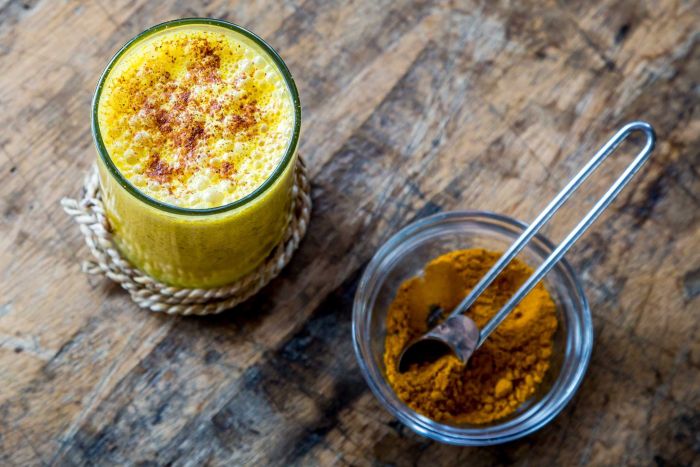

You may have seen it popping up on cafe menus recently — the “golden latte”. It’s hot milk mixed with turmeric, coconut oil, maybe a bit of honey.
Turmeric has been proclaimed a superfood; a health booster — the yellow powder used as a central component in Asian cooking for thousands of years.
But what does the evidence say about the health benefits of taking turmeric? And are some forms better than others?
Contents
Why turmeric?
Long before it found its way to your latte, turmeric was known as a healing food in the ancient Indian system of medicine Ayurveda — where it was used to treat respiratory conditions or as a topical application to soothe or heal the skin. Many today use it mixed with milk or water to ease a sore throat or an upset stomach.
But interest in the spice’s possible health benefits ramped up after a 2006 study found that older Singaporeans who ate more curry had less cognitive decline. That led to research into which components of curry could be causing the effect, and a growing interest in the properties of turmeric.
It’s not the spice itself that’s key, rather it’s an active compound within turmeric called curcumin. Research has found that curcumin has some anti-oxidant and anti-inflammatory properties.
“Curcumin is a very powerful anti-inflammatory agent,” said Professor Manohar Garg, director of the nutraceuticals research program at the University of Newcastle.
Because inflammation is linked to a range of chronic conditions and diseases, among them arthritis, Alzheimer’s and heart disease, researchers argue curcumin could help reduce the risk of those diseases by limiting inflammation in the body.
“It’s very powerful, the most powerful food I know of, for fighting inflammation in the body,” Professor Garg said.
Research conducted by the professor and his team found those people taking a combination of curcumin and a phytosterol (a naturally occurring steroid found in plants) reduced their cholesterol levels over a four-week period compared to a group who received a placebo.
“There’s some cholesterol-lowering effect from curcumin, and some cholesterol-lowering effect from phytosterols, but if you combine them together it’s a synergistic effect. It’s beyond what you expect from the two compounds separately,” Professor Garg said.
Is curcumin a brain-booster?
Other research into curcumin has focused on its potential to improve cognitive function, particularly in older people.
Professor Andrew Scholey, director of the Centre for Human Psychopharmacology at Swinburne University, has a research group looking into this.
In an experiment conducted by the group, researchers took 80 people in their 60s and 70s and gave some a curcumin supplement while others received a placebo. The study participants then completed computerised cognitive tests that used their working memory.
“Working memory’s where you hoard information in mind or in consciousness,” Professor Scholey said.
“If you’re learning a new PIN for a credit card, the first thing you’ll do is rehearse that number to try and make sure you consolidate it.”
The researchers found those in the group given curcumin supplements had better working memory and an improved mood while taking the cognitive tests over a 28-day period.
Professor Scholey said it was possible the curcumin was improving blood flow to the brain in those who took the supplements.
“There is some work showing that curcumin can improve what’s called endothelial function — that refers to the cells that line blood vessels, which can be in various degrees of elasticity or stiffness,” Professor Scholey said.
“If your vessels are a bit more elastic then you have better blood flow to all organs, including the brain. The better your blood flow to the brain is, the better your cognitive function is likely to be. We figure that’s one aspect.”
Professor Scholey’s study was funded by a manufacturer of a turmeric supplement, but they had no input into the study design or its findings.
How strong is the evidence overall?
Both Professor Garg and Professor Scholey said while their recent results were promising, it’s still early days when it comes to establishing the health benefits of turmeric.
“We have some evidence, if you look at the in vitro cellular studies, if you look at animal studies, the evidence is very strong,” Professor Garg said.
“But humans are not animals. We need to provide more evidence from clinical trials … to get solid evidence of the health benefits of curcumin.”
How much do you need to take?
The amounts of curcumin used in the above studies were quite high — from about 80 milligrams (in the cognition study) through to 200 milligrams (in the cholesterol research). Professor Garg said you’ll get between 100 to 150 milligrams of curcumin in a full teaspoon of turmeric, but it can vary from powder to powder.
The other thing to think about is that curcumin passes through your body quite quickly. In order to keep enough of it in your body to be effectively absorbed and useful, you’d want to be having it with lunch and dinner most days of the week (as in some Indian diets), Professor Garg said.
“I’m in favour of getting it from natural foods, and if we can get enough curcumin from turmeric, that’s the best way of consuming these products,” he said.
The other option is to take supplements, some of which may be tweaked so they’re more readily absorbed by the body, Professor Scholey said.
“The question is when you eat turmeric as a powder, how much is actually going to be absorbed?” he said.
“Studies seem to show it’s unlikely to be absorbed at the same level as some of these commercialised extracts, which I know doesn’t sit beautifully with a nice picture of natural foods and products having these benefits, but unfortunately that’s what the science shows.”
And the golden latte so popular at hip cafes around Australia’s inner cities? If you’re having it as a one-off thing, it definitely won’t have a high enough dose of curcumin to have an impact on your health, Professor Scholey said.
“Most of the curcumin within that turmeric latte is likely to come out the other end, unfortunately,” he said.
Can you take too much?
Using turmeric as a spice in food is safe — the only danger being if you use too much, you might have an upset stomach.
But while turmeric shouldn’t be a problem, taking concentrated curcumin in a supplement form can be dangerous for those who are on blood-thinning medications.
“If you’re on medications like aspirin, warfarin, ibuprofen, naproxen, all these medications are anti-coagulants,” Professor Garg said.
“So if you take curcumin along with these medications, one needs to be a bit careful because it can reduce the clotting time and may increase bleeding, especially if you’re undergoing some kind of surgery.”
[“Source-ndtv”]




